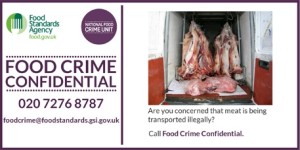The UK Food Standards Agency’s National Food Crime Unit has launched Food Crime Confidential. This is a reporting facility where anyone with suspicions about food crime can report them safely and in confidence, over the phone or through email. The facility is particularly targeted at those working in or around the UK food industry.
 The FSA’s National Food Crime Unit (NFCU) works with partners to protect people from serious criminal activity that impacts the safety or authenticity of food and drink they consume.
The FSA’s National Food Crime Unit (NFCU) works with partners to protect people from serious criminal activity that impacts the safety or authenticity of food and drink they consume.
Food crime involves dishonesty at any stage in the production or supply of food. It is often complex and likely to be seriously detrimental to consumers, businesses or the general public interest.
NFCU would like to receive any information relating to suspected dishonesty involving food, drink or animal feed. In addition to identifying and being able to tackle specific instances of food crime, such information will help us learn more about the circumstances that make offending possible.
The National Food Crime Unit would like to hear from anyone if they have suspicions including:
that food or drink contains things which it shouldn’t
that methods used in your workplace for producing, processing, storing, labelling or transporting food do not seem quite right
that an item of food or drink says it is of a certain quality or from a specific place or region, but it doesn’t appear to be.
Call 0207 276 8787 or email foodcrime@foodstandards.gsi.gov.uk
Head of Food Crime at the FSA, Andy Morling said: ‘The National Food Crime Unit is committed to putting consumers first in everything we do. That is why we are launching Food Crime Confidential today to ensure that those with information about food crime can report it in confidence. The facility is open to anyone who has information about food which is being dishonestly produced, manufactured or sold.
‘We particularly want to hear from those who work in or around the UK food industry. We recognise that picking up the phone to pass on suspicions about an employer or an associate can be a big deal. That’s why we’ll ensure the information provided will be handled sensitively and professionally.’



